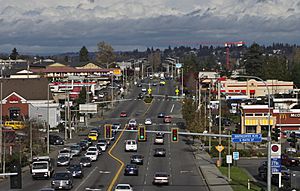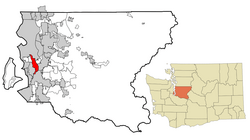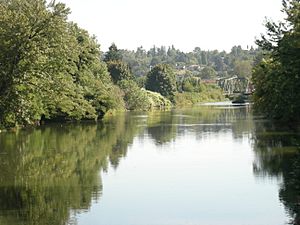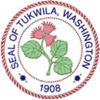Tukwila, Washington facts for kids
Quick facts for kids
Tukwila, Washington
|
||
|---|---|---|

International Boulevard from 154th Street
|
||
|
||
| Nickname(s):
Hazelnut City
|
||

Location of Tukwila in King County
|
||
| Country | United States | |
| State | Washington | |
| County | King | |
| Incorporated | June 23, 1908 | |
| Government | ||
| • Type | Mayor–council | |
| Area | ||
| • Total | 9.60 sq mi (24.86 km2) | |
| • Land | 9.19 sq mi (23.79 km2) | |
| • Water | 0.41 sq mi (1.07 km2) | |
| Elevation | 144 ft (44 m) | |
| Population
(2020)
|
||
| • Total | 21,798 | |
| • Estimate
(2023)
|
21,135 | |
| • Density | 2,301.20/sq mi (888.49/km2) | |
| Time zone | UTC−8 (Pacific (PST)) | |
| • Summer (DST) | UTC−7 (PDT) | |
| ZIP Codes |
98108, 98138, 98168, 98178, 98188
|
|
| Area code(s) | 206 | |
| FIPS code | 53-72625 | |
| GNIS feature ID | 1509106 | |

Tukwila (pronounced "tuk-WIL-uh") is a city in King County, Washington, United States. It is located just south of Seattle. In 2020, about 21,798 people lived there.
Tukwila is a busy place with many businesses. People come here to work and shop every day. The city is a good spot for industries because of its rivers, highways, railroads, and its closeness to Seattle–Tacoma International Airport.
Contents
History of Tukwila
The first people to live in the Tukwila area were the Duwamish. They built their homes along the Black and Duwamish rivers. The name "Tukwila" comes from a word in the Chinook Jargon language, meaning "nut" or "hazelnut". This is because many hazelnut trees grew there.
The Duwamish people lived in cedar longhouses. They hunted, fished, and gathered wild berries. They also used the rivers to trade with other groups.
Early Settlers and Growth
In 1853, Joseph Foster became the first white settler in Tukwila. He was a pioneer from Canada who had traveled from Wisconsin. Foster was known as the "Father of Tukwila." He served in the Washington Territorial Assembly for 22 years. This was like being a representative for the area before Washington became a state.
Today, the land where Foster's home once stood is part of Fort Dent Park. This park was also a military base during the Indian Wars in the 1850s. The Foster neighborhood in Tukwila, where Foster High School is, is named after him.
In its early days, Tukwila was a farming center and a trading spot along the Duwamish River. The population grew, and more businesses related to farming started. Early electric trains ran along Interurban Avenue, connecting Tukwila to Renton and Tacoma. This train service ran from 1902 to 1928, making travel between Seattle and Tacoma much faster.
A post office opened in 1904 in Riverton, a neighborhood in Tukwila. The original Tukwila area was also settled in 1904. The first macadam paved road in Washington state was in Tukwila. This new type of road paving helped improve travel.
Becoming a City
Tukwila officially became a city on June 14, 1908. It was called a "fourth-class city" and had about 450 people. The main reasons for becoming a city were to get better fire protection, water services, schools, and safer roads.
The first city limits were just one square mile around the local train station. Later, the Riverton and Foster areas joined the city. Joel Shomaker, a newspaperman, was Tukwila's first mayor. He gave the city its name. One of the first city council members was Del Adelphia, a famous magician.
Geography and Location
Tukwila is in western King County, south of Seattle. It is located between the cities of SeaTac to the west and Renton to the east. The Green River and Interstate 5 (a major highway) both run through the city from south to north.
The United States Census Bureau says that Tukwila covers about 9.60 square miles (24.86 square kilometers). Most of this area is land, with a small part being water.
The tallest building in Tukwila is the Airmark Apartments and Hotel Interurban. This 19-story building opened in 2018. It is the tallest building between Seattle and Tacoma.
Tukwila Neighborhoods
Tukwila is divided into several neighborhoods. These divisions help the city with planning and development. Here are some of the neighborhoods:
- Allentown
- Cascade View
- Duwamish
- Foster
- Foster Point
- McMicken
- Riverton
- Ryan Hill
- Southcenter (Urban Center)
- Thorndyke
- Tukwila Hill
Population and People
| Historical population | |||
|---|---|---|---|
| Census | Pop. | %± | |
| 1910 | 361 | — | |
| 1920 | 453 | 25.5% | |
| 1930 | 424 | −6.4% | |
| 1940 | 521 | 22.9% | |
| 1950 | 800 | 53.6% | |
| 1960 | 1,804 | 125.5% | |
| 1970 | 3,509 | 94.5% | |
| 1980 | 3,578 | 2.0% | |
| 1990 | 11,874 | 231.9% | |
| 2000 | 17,181 | 44.7% | |
| 2010 | 19,107 | 11.2% | |
| 2020 | 21,798 | 14.1% | |
| 2023 (est.) | 21,135 | 10.6% | |
| U.S. Decennial Census 2020 Census |
|||
In 2022, there were about 8,098 households in Tukwila. On average, each household had 2.64 people. The average household income was $76,331. About 13.3% of the people in the city lived at or below the poverty line.
About 72.4% of the people in Tukwila were employed. Also, 25.8% had a bachelor's degree or higher, and 82.1% had a high school diploma.
The average age of people in Tukwila was 36.0 years old.
2020 Census Information
| Race / ethnicity (NH = non-Hispanic) | Pop. 2000 | Pop. 2010 | Pop. 2020 | % 2000 | % 2010 | % 2020 |
|---|---|---|---|---|---|---|
| White alone (NH) | 9,297 | 7,186 | 6,102 | 54.11% | 37.61% | 27.99% |
| Black or African American alone (NH) | 2,174 | 3,350 | 4,059 | 12.65% | 17.53% | 18.62% |
| Native American or Alaska Native alone (NH) | 190 | 143 | 124 | 1.11% | 0.75% | 0.57% |
| Asian alone (NH) | 1,858 | 3,615 | 5,689 | 10.81% | 18.92% | 26.10% |
| Pacific Islander alone (NH) | 311 | 521 | 516 | 1.81% | 2.73% | 2.37% |
| Other race alone (NH) | 57 | 49 | 92 | 0.33% | 0.26% | 0.42% |
| Mixed race or multiracial (NH) | 965 | 894 | 1,140 | 5.62% | 4.68% | 5.23% |
| Hispanic or Latino (any race) | 2,329 | 3,349 | 4,076 | 13.56% | 17.53% | 18.70% |
| Total | 17,181 | 19,107 | 21,798 | 100.00% | 100.00% | 100.00% |
According to the 2020 census, Tukwila had 21,798 people. There were 8,168 households and 4,783 families. The city had a population density of about 2,373 people per square mile (888 per square kilometer).
The racial makeup of the city was:
- 30.03% White
- 19.02% African American
- 1.08% Native American
- 26.19% Asian
- 2.45% Pacific Islander
- 11.32% from other races
- 9.91% from two or more races
Hispanic or Latino people made up 18.70% of the population. About 18.0% of residents were under 18 years old, and 11.2% were 65 or older.
Economy and Jobs
Tukwila's location near rivers, highways, and railroads makes it a very important place for business. Around 45,000 people work in Tukwila.
Westfield Southcenter is a very large shopping mall located here. Many Boeing company buildings are also in Tukwila. The city is also home to large computer data centers for companies like Microsoft and Amazon. These centers store and manage a lot of digital information.
In 2021, a new large business area called the Prato District was announced. It will include offices, factories, and shops.
Major Employers in Tukwila
Many companies provide jobs in Tukwila. Here are some of the largest employers:
- Boeing Employee's Credit Union (a credit union)
- King County Department of Natural Resources (government)
- Boeing Company (aircraft manufacturing)
- Prime Now LLC (electronic shopping)
- King County Housing Authority (housing assistance)
- Nordstrom, Inc. (department stores)
- Costco (warehouse club)
- Cascade Behavioral Hospital LLC (healthcare)
- Amazon (e-commerce)
- Sound Mental Health (healthcare)
Education in Tukwila
Most of Tukwila is served by the Tukwila School District. This district has five schools:
- Cascade View Elementary School
- Thorndyke Elementary School
- Tukwila Elementary School
- Showalter Middle School
- Foster High School
Foster High School is known for being very diverse. In 2016, students from 50 different countries who spoke 45 different languages attended the school.
Raisbeck Aviation High School is also in Tukwila. It's a public technical school that opened in 2004. Other parts of Tukwila are served by the Highline Public Schools, Renton School District, Kent School District, and Seattle Public Schools.
Sports in Tukwila
The Seattle Seawolves, a professional rugby team, used to play their home games at the Starfire Sports complex. This complex was also where the Seattle Sounders FC soccer team trained. The Seattle Reign FC women's soccer team moved their training to Starfire in 2023.
Culture and Attractions
The Museum of Flight is a famous air and space museum located in the northern part of Tukwila, next to Boeing Field. It's a great place to learn about planes and space travel.
Tukwila is also home to the Rainier Symphony. This group performs several concerts each year at the Foster Performing Arts Center.
Transportation Options
Tukwila has several ways to get around. The city is served by Amtrak Cascades and Sound Transit's Sounder commuter rail at the Tukwila station. This means you can take trains to other cities.
Sound Transit's Link light rail service also has a stop at the Tukwila International Boulevard station. Light rail trains connect Tukwila to Seattle and other nearby areas.
Famous People from Tukwila
- William Cumming, an artist and political activist.
- Zack Hudgins, a former member of the Washington House of Representatives (a state lawmaker).
- Jim North, an NFL player for the Washington Commanders.
- Mario Segale, a real estate developer. The famous video game character Mario was named after him!
See also
 In Spanish: Tukwila (Washington) para niños
In Spanish: Tukwila (Washington) para niños
 | Delilah Pierce |
 | Gordon Parks |
 | Augusta Savage |
 | Charles Ethan Porter |


